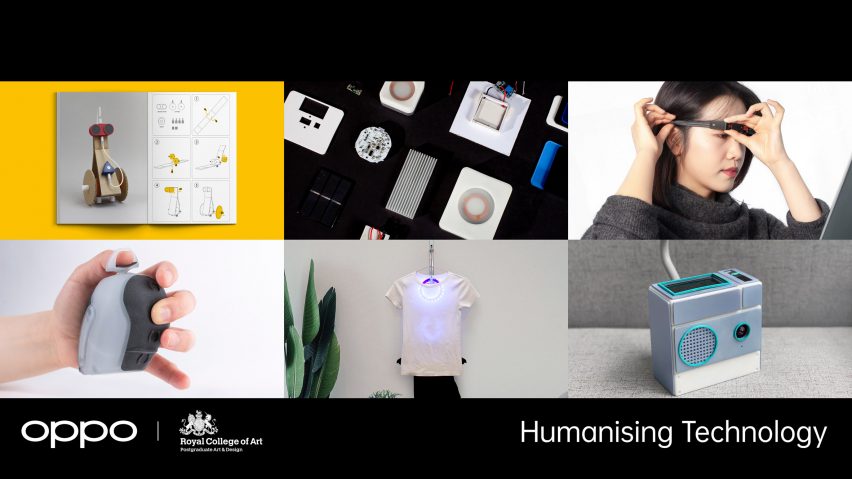Dezeen has teamed up with global technology company OPPO to present seven products designed by postgraduate Royal College of Art students that could help "integrate technology into our lives more seamlessly".
The seven people-centric projects were developed by five of eight students enrolled on the university's MA Design Products programme, who were mentored by the company's design hub, OPPO London Design Center.
OPPO's brief, entitled Humanising Technology, challenged students to imagine ways to make technology "more human" – giving rise to a diverse collection of products that range from child-friendly devices to a modular smartphone.
"OPPO is dedicated to introducing products that fuse art and design with innovative technology," explained OPPO London Design Center's Jintong Zhu.
"This is what inspired the brief, Humanising Technology," she continued. "It is an opportunity to explore, question, and analyse technology to make it more human – familiar, comfortable, and intimate – through developing people-centric designs and products."
"RCA Design Products students were challenged to answer some of the questions posed by this rapid development of technology," added OPPO. "How can we integrate technology into our lives more seamlessly and how can we use design as a powerful tool to rethink our relationship with technology?"
The digital exhibition follows a talk featured by Dezeen earlier this week with OPPO, alongside tutors and students from the RCA, to offer further insight into the value and theme of the collaboration.
Scroll down to find out more about the seven featured student projects, and visit the RCA's online exhibition for the collaboration to see all of the work produced by the studio.
Nect is a wireless "air-charging" technology that has been developed by Lilin Jiao for use in a person's home to ensure their mobile phone does not run out of power.
The concept takes its cues from parasitic relationships found in nature, enabling mobile phone devices to power themselves by harvesting energy from products nearby.
Animate is a robotic toy-making kit that Matthieu Muller has designed to make technology accessible and engaging for children.
The kit comprises cardboard pieces and a multitude of brightly-coloured electronic components that can be combined to make toys, alongside an accompanying handbook to help children with their designs.
Another project by Muller is SmartKit, a set of three cardboard toys that are designed to be used in collaboration with smartphones.
Children can animate the toys, which include a car, plane and spaceship, using the features of a smartphone such as its speakers or flash. By "combining the physical and the digital world" in this way, Muller hopes children will develop healthy relationships with technology.
Find out more about SmartKit ›
Duo is a concept for a modular smartphone by Roc H Biel composed of two parts: an electronic core and interchangeable screen. This modular design enables the device to be transformed from a smartphone to a tablet so that users can "always access their data from a single source".
It was developed in response to an increase in voice assistants and a reduced need for visual feedback, as well as Biel's ambition to make the technology industry more sustainable.
Biel also worked with OPPO on the development of Fenics, a modular remote controller for use in gaming or to power digital tools like drones or cameras.
The controller has a modular composition and customisable pressure buttons that allow a user to personalise its function and the gestures to which it responds, which facilitates quick reaction times.
Jiarui Liao developed a "self-service platform" for fashion retailers that invites customers to develop a pair of glasses that perfectly fit their features.
Named ToolForm, the service seeks to demonstrate how the manufacturing of products within the fashion industry can be made more resource-efficient and ergonomic than it is currently by introducing end-users into the process.
Find out more about Toolform ›
Wearloop is a wall-mounted device onto which users can hang their dirty clothes, and then cleaned using air and UV light.
The technology was conceptualised by Eric Saldanha in response to the negative environmental impact associated with excessive washing, drying, ironing, and dry-cleaning of garments, and is hoped to normalise the re-wear of clothes.
Find out more about Wearloop ›
Exhibition credits:
University: Royal College of Art (RCA)
Programme: MA Design Products – OPPO x RCA Humanising Technology
Studio: OPPO London Design Center
Tutors: Alon Meron (RCA), Jintong Zhu (OPPO London Design Center) and Roberto Ruffoni (OPPO London Design Center)

